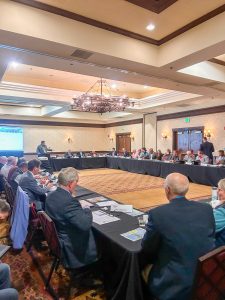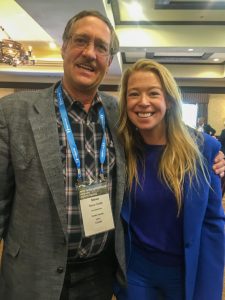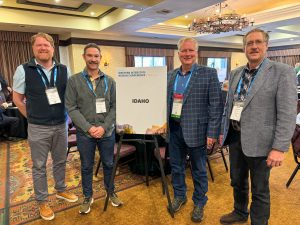Idaho County Members Visit California for 2024 WIR Conference
16 May 2024, by Jessica Roth Share :
By Steve Smith, Custer County Commissioner
County elected officials and staff from Idaho ventured to Mariposa County, California, to participate in the National Association of Counties (NACo) 2024 Western Interstate Region (WIR) Conference. The event, held May 7 – 10 at the Tenaya Lodge in Yosemite National Park, brought together county officials from across the nation to focus on pressing issues facing Western counties and residents.
Each year, counties within the fifteen Western states – Alaska, Arizona, California, Colorado, Hawai’i, Idaho, Montana, Nevada, New Mexico, North Dakota, Oregon, South Dakota, Utah, Washington, and Wyoming take turns hosting the WIR conference. The event affords attendees the opportunity to interact with federal, state, and regional policymakers, participate in educational sessions, and take home tools to address challenges.
The event started on Tuesday, May 7, with pre-conference activities which included two mobile tours of Yosemite National Park. The tours focused on the federal, state, and local partnership in disaster recovery and response efforts and how tourism and conservation efforts impact counties.
 The conference officially kicked off on Wednesday, May 8, with the Public Lands Trust Fund Trustees Meeting, which addressed many of the numbers and other budgeting criteria for the conference and future events, such as NACo’s Payment in Lieu of Taxes (PILT) Fly-In. WIR leadership groups make a tremendous effort to host these conferences each year and to synthesize issues that western states’ counties share so that attendees can contribute and source practical solutions for their citizens.
The conference officially kicked off on Wednesday, May 8, with the Public Lands Trust Fund Trustees Meeting, which addressed many of the numbers and other budgeting criteria for the conference and future events, such as NACo’s Payment in Lieu of Taxes (PILT) Fly-In. WIR leadership groups make a tremendous effort to host these conferences each year and to synthesize issues that western states’ counties share so that attendees can contribute and source practical solutions for their citizens.
Later in the day, members of the Environment, Energy & Land Use, Agriculture & Rural Affairs, and Public Lands Steering Committees embarked on a mobile tour of the Sierras to enjoy the beautiful scenery and to explore a project site focused on removing fuel loads. In Idaho, what would be called a “slash pile” consisting of tree limbs and other debris left after a tree harvest was equivocated to whole trees that had come down and were covering the forest floor. The process for managing the fallen giants was to cut them down into six-to-eight-foot manageable chunks and then burn them in later winter months.
The tour also extended to Bass Lake, which had been impacted by the high number of tourists – an issue also faced by Red Fish Lake in Custer County, Idaho. Bass Lake was created by a power utility company, Pacific Gas and Electric Company (PG&E), for hydro generation, which shares water-rights holders, private-property owners, and Forest Service Management for the camping and shore portions of the lake.
Several officials form the California State departments spoke about past and future projects and lessons learned in the process. Many panel discussions were offered for varying interests and challenges. One panel discussion covered the fires in California and the solutions PG&E put in place to limit fires starting from power lines.
The conference also allowed members to schedule an appointment with the Forest Service to voice county objections regarding the Biden Administration Executive Order pertaining to “Old Growth Timber” in our respective forests. This was because of the efforts in NACo’s Public Lands Committee Meetings where many of the counties were not engaged at their level with the Forest Service. The Forest Service then came to WIR and made the change to engage county members and coordinate at the local level.
 A standout of the event was the fantastic presentation given by keynote speaker Adrianne Haslet, who shared her life experience as a Boston Marathon bombing survivor. Attendees were left in awe after hearing her incredible journey and positive life lessons, and many felt compelled to get a photo with her after the presentation, myself included (see left). Prominent themes from Haslet’s talk were:
A standout of the event was the fantastic presentation given by keynote speaker Adrianne Haslet, who shared her life experience as a Boston Marathon bombing survivor. Attendees were left in awe after hearing her incredible journey and positive life lessons, and many felt compelled to get a photo with her after the presentation, myself included (see left). Prominent themes from Haslet’s talk were:
– When someone says that you cannot do something, it reflects their limitations, not yours. Haslet expressed that she gained this insight while fighting to reclaim her physical abilities she had prior to losing the lower part of her left leg in the terrorist bombing.
– Your mindset and attitude matter most, regardless of what’s happened to you. The terrorist only had control of her for three and a half seconds, as that is how long it took for the bomb to go off and cause destruction. But every moment after was up Haslet. She chose to take back control of her life and make decisions that moved her forward instead of limiting herself because of her situation.
– Surround yourself with those who care about you, support you, and want to see you succeed. Haslet expressed heartfelt appreciation for the surgeons, firefighters, and first responders who administered first aid and fastened a tourniquet around her leg – all of which saved her life. She also acknowledged the professional athletes that ran alongside her in solidarity when she was finally able to finish the marathon with her prosthetic leg.
– Learn to observe but not absorb. Like many survivors of a traumatic experience, a smell or a sound can transport her back to those fateful three and a half seconds. Haslet shared how she has learned to separate her experiences from those of others’ and is able to have meaningful conversations with trauma survivors without being emotionally and mentally triggered.
The last lighter and relatable insight Haslet shared is that she loves Cheetos—which also happen to be my personal favorite snack.
 On the final day of conference, attendees gathered at their assigned table for their state to vote on WIR leadership for the next year. Mono County, Calif. Supervisor John Peters and Fremont County, Colo. Commissioner Dwayne McFall were voted as first and second vice president. There was also a brief awards ceremony, where Ravalli County, Mont. Commissioner Greg Chilcott was recognized as the Dale Sowards Award winner in honor of his service to public lands counties, NACo, WIR, and counties as a whole.
On the final day of conference, attendees gathered at their assigned table for their state to vote on WIR leadership for the next year. Mono County, Calif. Supervisor John Peters and Fremont County, Colo. Commissioner Dwayne McFall were voted as first and second vice president. There was also a brief awards ceremony, where Ravalli County, Mont. Commissioner Greg Chilcott was recognized as the Dale Sowards Award winner in honor of his service to public lands counties, NACo, WIR, and counties as a whole.
I was honored to attend this conference and represent my county’s voice in the important discussions. I greatly appreciate WIR leadership for facilitating this event and for their thoughtful planning of relevant workshops, activities, and speakers. I’d also to thank my colleagues from Idaho who traveled for the event, including Skip Brandt, Idaho County Commissioner and WIR Representative, Vic Pearson, Franklin County Prosecutor; Jeff Hough, Bannock County Commissioner; John David Davidson, Blaine County Treasurer; and Seth Grigg, IAC Executive Director.
For more details about the conference, read NACo’s 2024 WIR Conference recap or visit their website.
For conference photos, visit our Flickr album.






